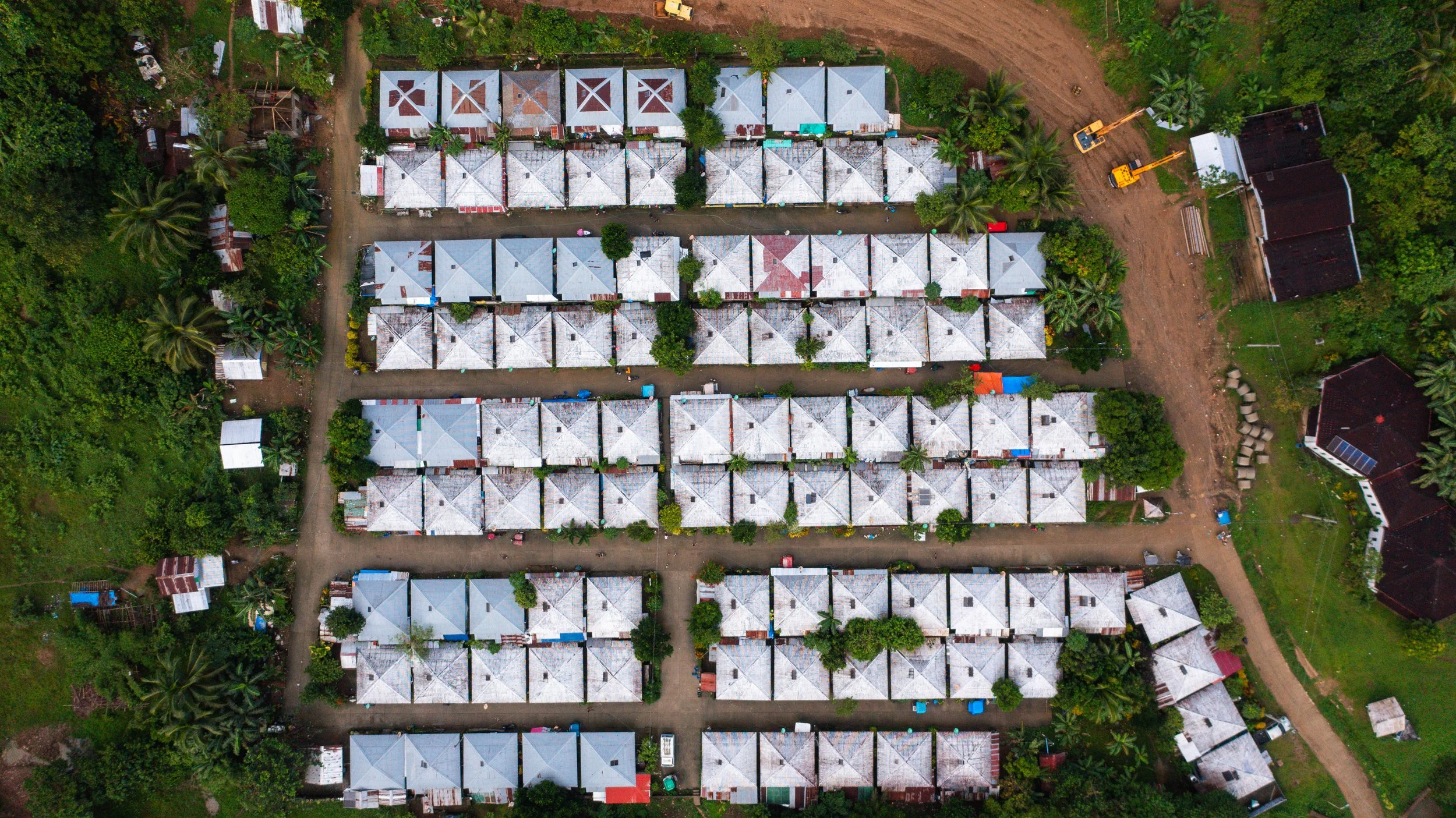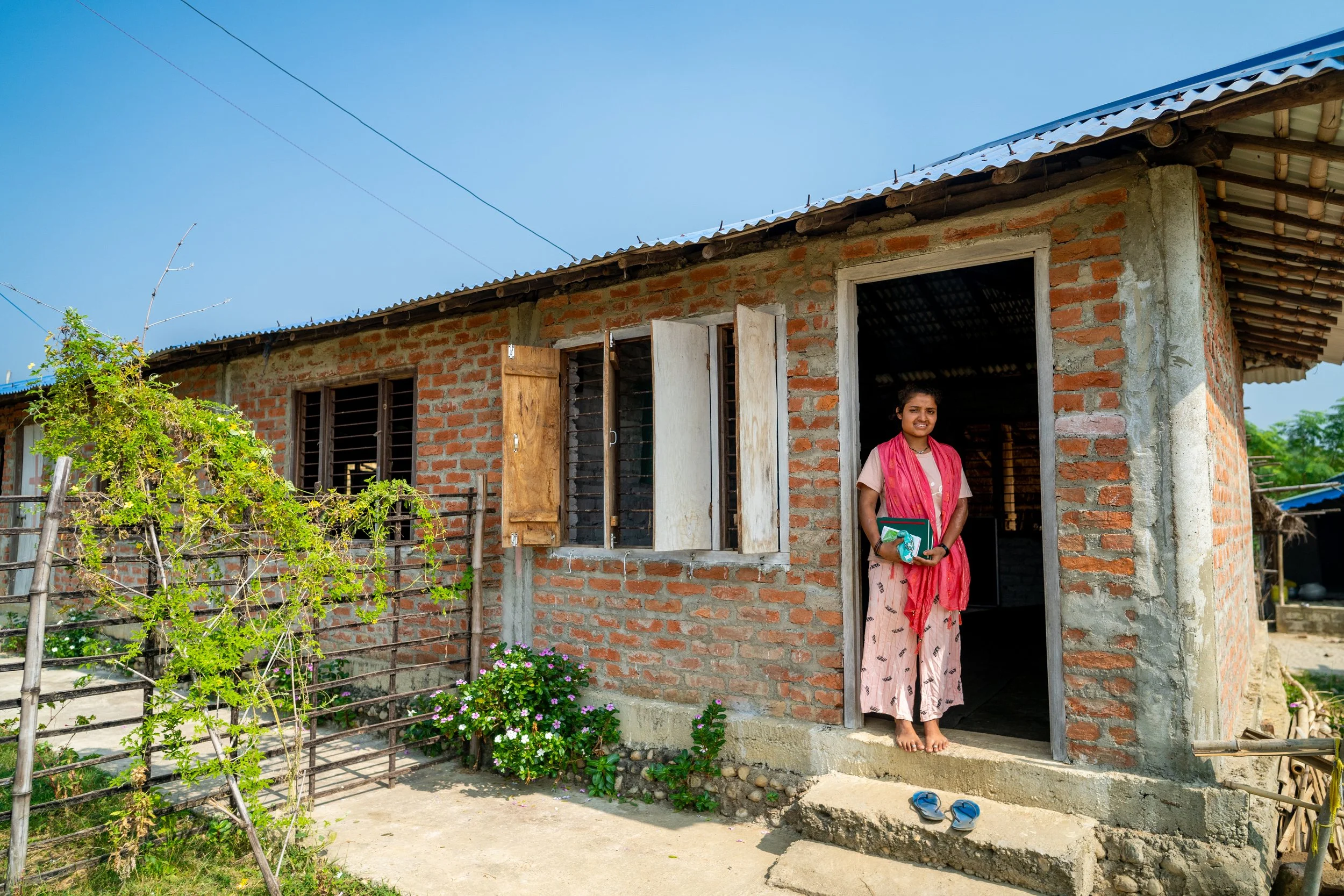Affordable Housing & Technology
BASE Bahay Foundation

The Beginning
The Hilti Foundation established the BASE Bahay Foundation in the Philippines in 2014 with a clear vision: to revolutionize social housing in developing countries. At its core, this initiative champions the Cement Bamboo Frame Technology (CBFT), an innovative solution that harnesses bamboo as a green, disaster-resilient, and affordable building material.
Over the past decade, BASE Bahay has evolved into a leading global competence center for bamboo construction, committed not only to improving living conditions for low-income families but also to greening the construction industry, driving employment, and fostering economic growth in rural areas.

The Challenge
The world faces a profound housing crisis, with projections indicating that over three billion people could be living in substandard conditions by 2035. This challenge is exacerbated in regions prone to natural disasters, such as the Philippines and Nepal, where traditional housing often fails to withstand earthquakes and typhoons. For instance, Nepal has seen over a million homes destroyed by earthquakes in the last decade, with 70% of its national housing stock considered structurally unsafe.
Historically, bamboo's reputation as a "poor man's timber" has led to informal and non-durable construction, hindering its potential. The absence of professional standards, robust supply chains, adequate capacity, and sufficient financing mechanisms further impedes the delivery of high-quality, safe, and affordable bamboo homes for those who need them most, especially as inflation drives up conventional building costs.
Our Approach
The Cement Bamboo Frame Technology (CBFT) was developed to address these multifaceted challenges. CBFT is a hybrid construction method that integrates meticulously treated, load-bearing bamboo with metal connections and a mortar-cement plaster, transforming bamboo into a high-tech building resource.
Key aspects of our approach include:
Disaster Resilience & Durability
CBFT structures are engineered to withstand extreme natural events according to National building codes, including earthquakes and typhoons with winds up to 250 km/h. Rigorous testing has also confirmed their resistance to fire and insect infestation, contributing to an estimated lifetime of 50 years.
Sustainability & Affordability
Beyond its resilience, CBFT is an environmentally superior choice. A CBFT house has 60% to 70% less environmental impact than a conventional concrete house, equating to a nine-ton reduction in carbon emissions over its lifespan. As a highly renewable and cost-effective local resource (20-30 % less expensive than conventional buildings of similar quality), bamboo also naturally keeps buildings cool.
Ecosystem Development for Scale
Achieving widespread adoption requires a systemic approach that fosters both demand and supply:
Research & Innovation: The BASE Innovation Center (BIC), opened in Manila in 2021, serves as a global research and testing hub. It collaborates to advance CBFT, developing new applications, establishing international standards (e.g., ISO 22156, published in 2021), and influencing building codes. The technology is also being expanded for larger community structures such as weaving centers, food processing facilities, schools, and market halls.
Industry Development & Supply Chain: We actively foster a robust bamboo construction industry by supporting the establishment of independent bamboo treatment centers and local enterprises. This includes training and empowering entrepreneurs to supply high-quality bamboo poles and manufactured products like wall panels and prefabricated roof components.
Capacity Building & Professional Standards: The BASE Bamboo Academy provides government-accredited training for a wide range of professionals, ensuring the correct application of CBFT according to established standards and norms, promoting professional execution across the sector.
Demand Creation & Market Building: Strategic advocacy efforts focus on integrating CBFT into national building codes and engaging with government financing mechanisms and private sector investors.
Objectives and Goals
The primary objective is to profoundly improve the living conditions of low-income families through a durable, disaster-resilient housing technology. This overarching goal is supported by key strategic objectives:
To build a systemic solution capable of delivering social housing at a sustainable, large scale.
To green the construction industry by making bamboo a building material of choice, significantly reducing the environmental impact compared to conventional methods.
To drive employment and foster economic growth in rural environments by establishing a robust and professional bamboo supply industry, including profitable bamboo enterprises and independent building contractors.
To achieve the full development and ratification of national bamboo building codes in Nepal, the Philippines, Fiji, Colombia and Peru, and other countries, providing a stable regulatory framework for widespread adoption.
Partnerships and Collaborations
BASE Bahay Foundation: As the initiative's core implementing partner and global competence center, BASE Bahay Foundation leads the strategic development and on-the-ground execution of CBFT.
Academic and Research Institutions: The BASE Innovation Center (BIC) collaborates with over 25 leading international universities, including ETH Zurich, Coventry University, and De La Salle University, driving cutting-edge research and the development of international standards for bamboo construction.
Government and Public Sector Entities: Key partnerships with national and local government bodies, including the Department of Urban Development and Building Construction (DUDBC) in Nepal and relevant authorities in the Philippines, are crucial for integrating CBFT into national building codes and securing public financing for social housing.
Habitat for Humanity Nepal: A vital implementing partner, Habitat for Humanity Nepal works closely with BASE Bahay Foundation to deliver bamboo social housing solutions to disadvantaged families in Nepal at a large scale. The broader Habitat for Humanity International also supports house-building efforts in the Philippines and Nepal.
Local Bamboo Enterprises, Building Contractors and Affiliated Organizations: These are foundational partners in building a self-sustaining local industry, providing skilled labor, manufacturing engineered bamboo products, and delivering homes on the ground.

Impact
Homes Built: Over 2,400 CBFT units have been built in the Philippines, Nepal, India and Sri Lanka with the help of the BASE Bahay Foundation and Habitat for Humanity, providing safe and resilient homes. These homes have already successfully withstood numerous natural disasters.
Economic Empowerment: The development of sustainable supply chains has created regular jobs and incomes for hundreds of families. For example, 2 profitable bamboo enterprises are emerging in Nepal, 1 in Sri Lanka, and 9 in the Philippines.
Standardization & Recognition: CBFT has achieved AITECH accreditation, and its development contributed to the publication of the ISO 22156 standard for bamboo structures. BASE Bahay is globally recognized as a leading competence center for bamboo construction, influencing national building codes such as the Peruvian and Colombian.
Holistic Well-being: Beyond shelter, these safe homes have positively impacted the health, self-confidence, and social integration of beneficiary families.
Future Outlook & Engagement
Looking ahead, this initiative is aiming at delivering housing units on a large scale and achieving global impact.
Regulatory Integration
A key priority is the full development and ratification of bamboo building codes in both the Philippines and Nepal, providing certainty and stability for the industry.
Industry Professionalization
Continued efforts will focus on fostering more profitable bamboo enterprises and independent building contractors, ensuring a robust and self-sustaining industry.
International Reach
BASE Bahay aims to drive the affordable housing agenda and promote bamboo as a standard green building material in other emerging economies, with potential expansion into South-Asian countries as well as Central and South-America.
Ongoing Innovation
High-end research and development at the BASE Innovation Center will continue to explore new applications for bamboo, including larger community structures and further material advancements, solidifying its role in green construction and contributing to global sustainability agendas like COP30.


















